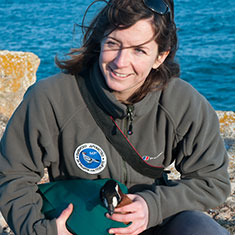Anne Harrison
Principal Research Officer, Wetland Landscapes & Processes

About me
I am a conservation ecologist with wide-ranging interests. I joined WWT in 2006 following my Zoology degree from University of Newcastle-Upon-Tyne and Masters in Biodiversity & Conservation from University of Leeds. I specialised in aerial surveys of waterbirds, where I designed and conducted surveys around UK coastlines and reported to government and developers to inform wind farm planning and SPA condition. I also managed and delivered habitat restoration and visitor centre design projects.
In 2011 I joined WWT’s Conservation Science department as Senior Species Recovery Officer. I spent four years coordinating the delivery of scientific elements of an EU Life project to conserve the wintering grounds of a globally threatened goose, designing and coordinating fieldwork and undertaking data analysis, reporting and scientific publication.
My specialisms are in spatial ecology, particularly habitat suitability modelling, prediction and mapping to inform conservation management decisions. I also provide in-house GIS and remote-sensing expertise.
My role
In my current role as Principal Research Officer in WWT’s Wetland and Landscape Ecology team, I am responsible for developing, delivering and communicating research to inform the conservation of wetlands and wetland nature, to support our Conservation Programmes. Our research hopes to demonstrate the multi-functional benefits of wetlands to society, from biodiversity and water quality improvements to flood attenuation and human health and wellbeing.
My current priorities are managing monitoring projects investigating the ecological benefits of working with natural processes to reduce flood risk, aka Natural Flood Management. By quantifying such benefits at the catchment scale, we hope to provide greater justification for the wider adoption of such schemes in the UK rural landscape.
Experience and interests
- Project management
- GIS & remote-sensing
- Designing and coordinating scientific studies
- Statistics – mixed modelling in R
- Ecological monitoring including vegetation, river habitats, aquatic invertebrates, water quality.
Publications
Harrison, A.L., Petkov, N., Mitev, D. Popgeorgiev, G., Gove, B. and Hilton, G. M. (2018). Scale-dependent habitat selection by wintering geese: implications for landscape management. Biodiversity and Conservation. 27: 167.
Petkov, N., Harrison, A.L, Stamenov, A. and Hilton, G. M. (2017). The impact of wintering geese on crop yields in Bulgarian Dobrudzha: implications for agri-environment schemes. European journal of Wildlife Research. 63: 66.
Lewis-Phillips, J, Brooks, S.J., Sayer, C.D., Patmore, I.R., Hilton, G, Harrison, A., Robson, H, Axmacher, J. (2019). Ponds as insect chimneys: restoring overgrown farmland ponds benefits birds through elevated productivity of emerging aquatic insects. Biological Conservation (In Press).
Lewis-Phillips, J, BROOKS, S, Sayer, C, McCrea, R, Siriwardena, G, Robson, H, Harrison, A. (2019). Seasonal benefits of farmland pond management for birds. Bird Study (In Press).
Hearn, R.D., Harrison, A.L. & Cranswick, P.A. 2015. International Single Species Action Plan for the Conservation of the Long-tailed Duck (Clangula hyemalis). AEWA Technical Series No. 57. Bonn, Germany
Return to meet the team